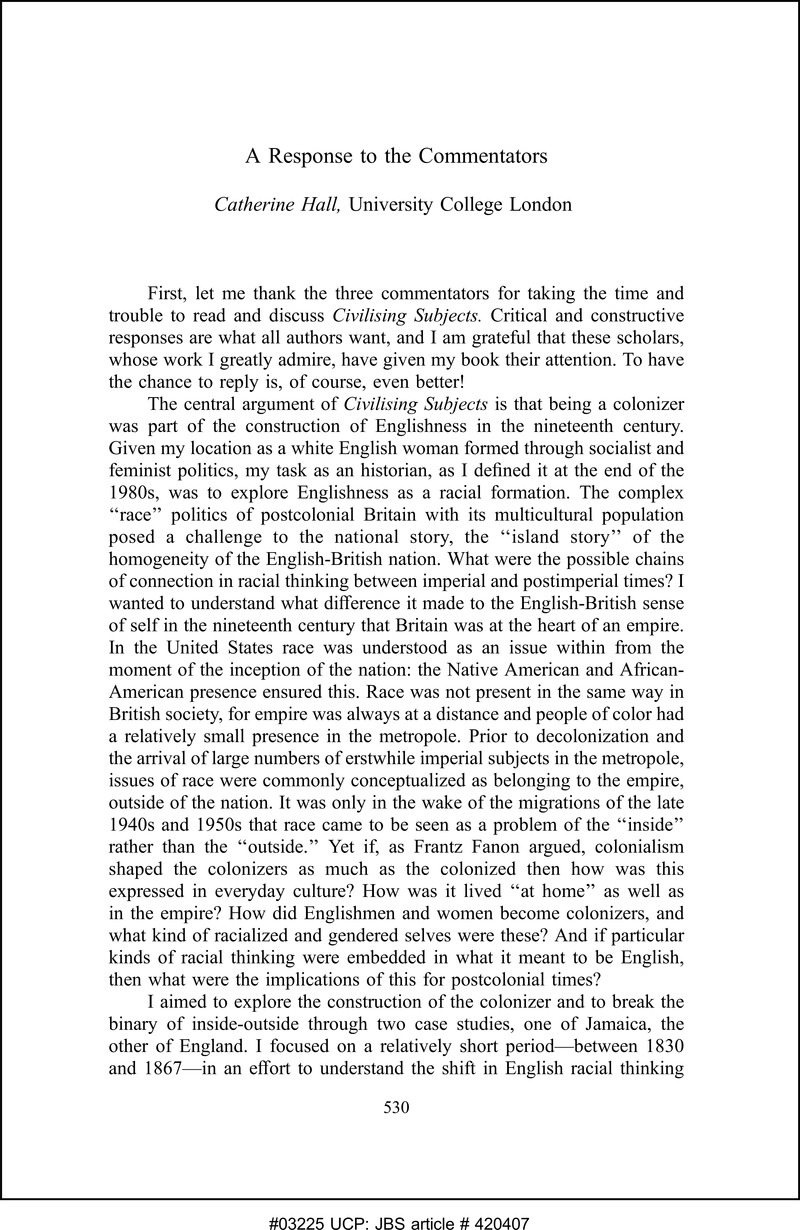No CrossRef data available.
Article contents
A Response to the Commentators
Published online by Cambridge University Press: 21 December 2012
Abstract

- Type
- Roundtable On Catherine Hall's Civilising Subjects: Metropole and Colony in the English Imagination, 1830-1867
- Information
- Copyright
- Copyright © North American Conference of British Studies 2003
References
1 See Hall, Catherine, McClelland, Keith, and Rendall, Jane, Defining the Victorian Nation: Class, Race, Gender and the British Reform Act of 1867 (Cambridge, 2000), pp. 62–70Google Scholar. See also Hall, Catherine, “The Rule of Difference: Gender, Class and Empire in the Making of the 1832 Reform Act,” in Gendered Nations: Nationalism and Gender Order in the Long Nineteenth Century, ed. Blom, Ida, Hagemann, Karen, and Hall, Catherine (Oxford, 2000), pp. 107–36Google Scholar.
2 Chakrabarty, Dipesh, Provincializing Europe: Postcolonial Thought and Historical Difference (Princeton, N.J., 2000), p. 9Google Scholar.
3 Viswanathan, Gauri, Masks of Conquest: Literary Study and British Rule in India (New York, 1989; London, 1999), p. 12Google Scholar.
4 Besson, Jean, Martha Brae's Two Histories: European Expansion and Caribbean Culture-Building in Jamaica (Chapel Hill, N.C., 2002)Google Scholar.
5 See, e.g., Lester, Alan, “British Settler Discourse and the Circuits of Empire,” History Workshop Journal 54 (Autumn 2002): 25–48CrossRefGoogle Scholar. For a helpful discussion of the concept of the web as a way of figuring relations of empire, see Ballantyne, Tony, Orientalism and Race: Aryanism in the British Empire (Basingstoke, 2002), esp. pp. 1–17CrossRefGoogle Scholar.
6 It is perhaps worth remarking that Leonore Davidoff and I faced a similar problem when writing Family Fortunes, a book that was based on two case studies, one of Birmingham and one of East Anglia. We resolved this by integrating our material and telling a national story. But the differences between Birmingham and East Anglia were much smaller than the differences between Birmingham and Jamaica.
7 Sinha, Mrinalini, Colonial Masculinity: The “Manly Englishman” and the “Effeminate Bengali” in the Late Nineteenth Century (Manchester, 1995)Google Scholar.
8 Chatterjee, Partha, The Nation and Its Fragments: Colonial and Postcolonial Histories (Princeton, N.J., 1993), p. 10Google Scholar.
9 Knibb, William, Speech on the Immediate Abolition of British Colonial Slavery (Newcastle, 1833), p. 13Google Scholar.


